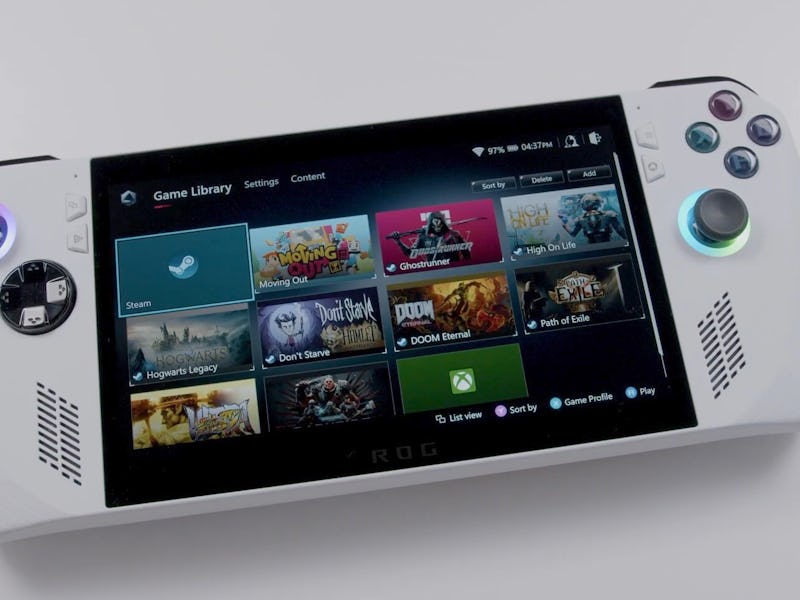Asus’ first PC Handheld Has Twice the Performance of a Steam Deck
The PC handheld appears to be a real powerhouse, but will the price right?

A handheld gaming PC from Asus’ ROG (Republic of Gamers) brand seemed like an April Fools’ joke when it was “announced” over the weekend, but apparently, the company is serious. The ROG Ally is a proper Steam Deck competitor, and you can sign up to pre-order the device on Best Buy now.
Why the company couched a real product announcement in an April Fools-time video — alongside misleading commentary from Asus ROG execs — is beside me, but the Ally does have a lot to offer. With custom silicon from AMD and Windows 11 support, the ROG Ally is set up to deliver a true Steam Deck alternative, assuming it can get the price right.
AMD and Windows 11
The ROG Ally could differentiate itself with performance and display quality.
Like the Steam Deck, the ROG Ally will use a custom Ryzen APU from AMD. It’s “the fastest AMD APU yet,” according to Asus, which makes the Ally reportedly twice as powerful as the Steam Deck, the company told tech YouTuber Dave2D.
The ROG Ally features more or less the same control layout as the Steam Deck, minus the haptic touchpads for simulating mouse controls and the dual backside buttons. Dave2D reports the Ally should also be a major step up in the display department with a 7-inch, 16:9, 1080p, 120Hz display. The Steam Deck, for anyone who hasn’t gone hands-on, is also seven inches, but with a 16:10 aspect ratio, odd 800p resolution, and only a 60Hz refresh rate.
The ROG Ally supports Asus’ external GPU system for even more performance.
The real test of the ROG Ally will be its battery life, and Asus didn’t share any details. With a custom chip and what seems like a roomier body for extra battery capacity, it’s possible the Ally could land somewhere in the wide 2–8 hour battery life window the Steam Deck’s 40Wh battery provides. Or maybe you turn up the graphics settings, and it lasts even shorter.
Unlike the Steam Deck, the ROG Ally runs Windows 11, which opens it up to several games that don’t play nice with Linux and Valve’s Proton compatibility layer. Windows 11 could also serve as a double-edged sword in the sense that it's far more complicated than Steam OS and the Steam Deck’s launcher, but maybe the trade-off is worth it. Asus is also sweetening the whole deal by offering a connector port and software support for its external GPUs, which means you could hook the Ally up to an external display and GPU and get a better visual experience than the Steam Deck offers docked.
The Price Problem
The Asus ROG Ally has tough competition in the Steam Deck.
With all of that on the table, the issue facing the Asus ROG Ally and any competitor to the Steam Deck, big or small, is Valve’s vertical integration. As the owner of the most popular game marketplaces in the world and hardware explicitly designed to run it, Valve sells the Steam Deck at a loss and makes up the cost with game transactions. Starting at $399 a pop, Valve is almost certainly doing that.
Asus doesn’t have that option and is planning on including nicer and more performant parts to boot. Per Dave2D, the company is pricing the ROG Ally competitively, but how competitive can it really be? If it’s compared to other Windows machines, that could look something like the $549 Ayaneo Air on the low end, the $1,099 Onexplayer Mini on the high end, or somewhere in between. I have to imagine Asus wants something as much of an impulse buy as the Steam Deck, but we’ll have to wait until the company shares official pricing to know for sure.
This article was originally published on